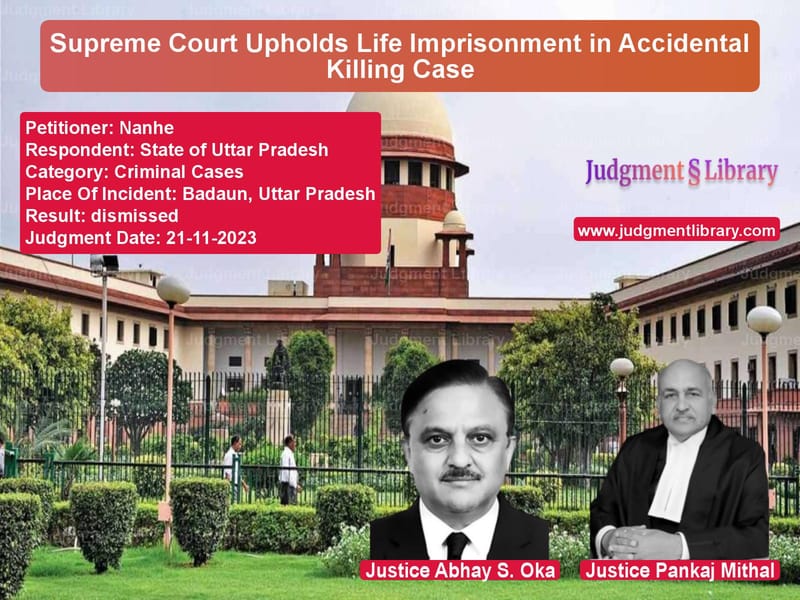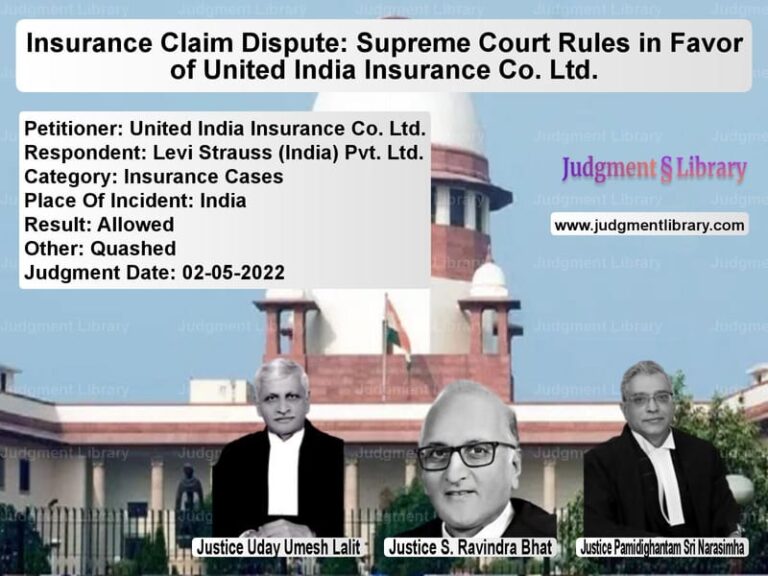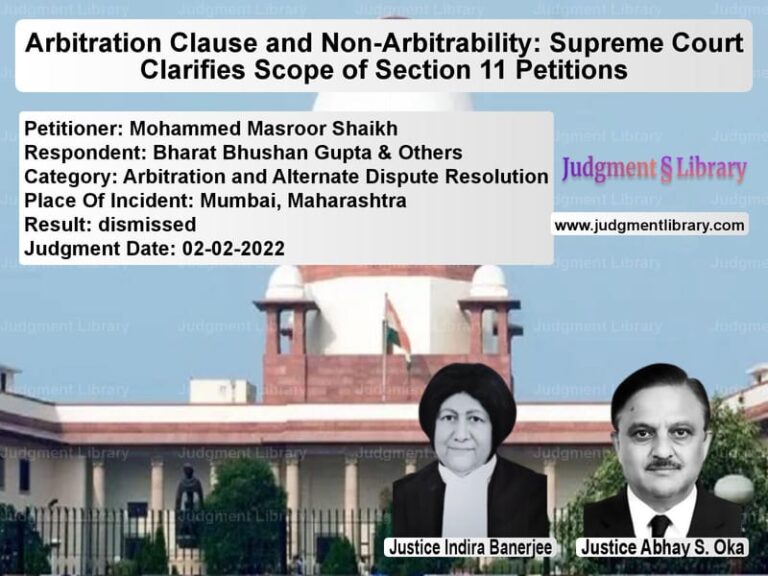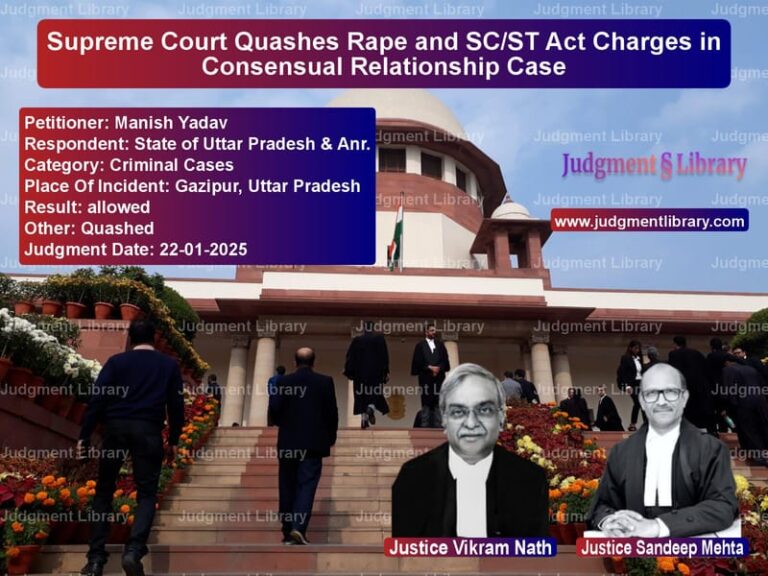Supreme Court Upholds Life Imprisonment in Accidental Killing Case
The Supreme Court of India recently ruled in the case of Nanhe vs. State of Uttar Pradesh, a criminal appeal addressing whether the conviction under Section 302 IPC should be reduced to culpable homicide not amounting to murder. The Court upheld the conviction and life imprisonment sentence, emphasizing the doctrine of transfer of malice and rejecting intoxication as a defense.
Background of the Case
The incident occurred on May 30, 2007, in Badaun, Uttar Pradesh. The appellant, Nanhe, had a heated altercation with Mahendra in a marketplace. Soon after, he turned around and fired a shot from his country-made pistol. The bullet pierced the neck of Saddam Hussain (son of the informant, Mohd. Ali) and then hit Mahendra’s head. Saddam Hussain succumbed to his injuries, and two separate cases were registered:
Read also: https://judgmentlibrary.com/supreme-court-revises-conviction-in-rajasthan-murder-case-key-takeaways/
- Crime No. 169/2007 – Under Sections 304 and 308 IPC.
- Crime No. 170/2007 – Under Section 25 of the Arms Act, 1959.
The trial court convicted Nanhe under Section 302 IPC (murder) and sentenced him to life imprisonment along with a fine of Rs. 5,000. Additionally, he was sentenced to two years of rigorous imprisonment under Section 25 of the Arms Act. The High Court upheld this conviction on January 31, 2019.
Arguments by the Petitioner (Nanhe)
The appellant sought relief from the Supreme Court, arguing:
- He had no intention to kill Saddam Hussain; his target was Mahendra.
- The shooting was an accident and should fall under Part II of Section 304 IPC (culpable homicide not amounting to murder).
- At the time of the incident, he was heavily intoxicated and did not fully understand his actions.
- His mental state due to intoxication should be considered under Section 86 IPC, which deals with offenses committed under intoxication.
Arguments by the Respondent (State of Uttar Pradesh)
The prosecution countered these claims, stating:
- The accused intentionally fired the shot, demonstrating recklessness and clear knowledge of the consequences.
- The doctrine of transfer of malice (Section 301 IPC) applies—since Nanhe intended to kill Mahendra but ended up killing Saddam, he is still guilty of murder.
- Intoxication cannot be used as a defense unless it was involuntary (i.e., administered without the person’s knowledge or against their will).
- The trial court and High Court correctly convicted him under Section 302 IPC.
Supreme Court’s Observations
The Supreme Court extensively analyzed the doctrine of transfer of malice under Section 301 IPC and the role of intoxication under Section 86 IPC.
- On Transfer of Malice (Section 301 IPC):
- The accused intended to fire at Mahendra, but the bullet hit and killed Saddam Hussain.
- The Court ruled that the intention to cause death is transferred to the actual victim.
- Precedents such as Shankarlal Kacharabhai vs. State of Gujarat and Rajbir Singh vs. State of U.P. were cited, affirming that the intent to harm one person but accidentally killing another still constitutes murder.
- On Intoxication (Section 86 IPC):
- Section 86 states that voluntary intoxication is not a valid defense unless the accused was unaware of the intoxication.
- The Court found that Nanhe voluntarily consumed alcohol and was able to walk and fire a gun, proving he had control over his actions.
- In Basdev vs. State of Pepsu, the Supreme Court ruled that drunkenness does not absolve criminal liability unless it renders the accused completely incapable of knowing the nature of their actions.
Key Excerpt from the Judgment
“The fact that there was no intention to cause injury to Saddam Hussain and he was accidentally hit can make no difference as the accused intended to cause injuries by firearm to Mahendra. The doctrine of transfer of malice applies, making him guilty under Section 302 IPC.”
The Court emphasized that the accused was capable of understanding his actions and had fired the gun intentionally, making intoxication an invalid defense.
Final Judgment and Directions
The Supreme Court ruled:
- The appeal was dismissed, and the conviction under Section 302 IPC was upheld.
- The accused will continue to serve life imprisonment and pay the fine.
- However, the Court allowed the accused to apply for remission under the state’s remission policy.
This judgment reinforces the principle that reckless firing in a public place, even if the intended victim is not harmed, can still lead to a murder conviction. The ruling clarifies that voluntary intoxication does not absolve a person from criminal liability.
Read also: https://judgmentlibrary.com/supreme-court-restores-bail-of-purushothaman-high-courts-order-quashed/
Petitioner Name: Nanhe.Respondent Name: State of Uttar Pradesh.Judgment By: Justice Abhay S. Oka, Justice Pankaj Mithal.Place Of Incident: Badaun, Uttar Pradesh.Judgment Date: 21-11-2023.
Don’t miss out on the full details! Download the complete judgment in PDF format below and gain valuable insights instantly!
Download Judgment: nanhe-vs-state-of-uttar-prade-supreme-court-of-india-judgment-dated-21-11-2023.pdf
Directly Download Judgment: Directly download this Judgment
See all petitions in Murder Cases
See all petitions in Bail and Anticipatory Bail
See all petitions in Attempt to Murder Cases
See all petitions in SC/ST Act Case
See all petitions in Judgment by Abhay S. Oka
See all petitions in Judgment by Pankaj Mithal
See all petitions in dismissed
See all petitions in supreme court of India judgments November 2023
See all petitions in 2023 judgments
See all posts in Criminal Cases Category
See all allowed petitions in Criminal Cases Category
See all Dismissed petitions in Criminal Cases Category
See all partially allowed petitions in Criminal Cases Category







